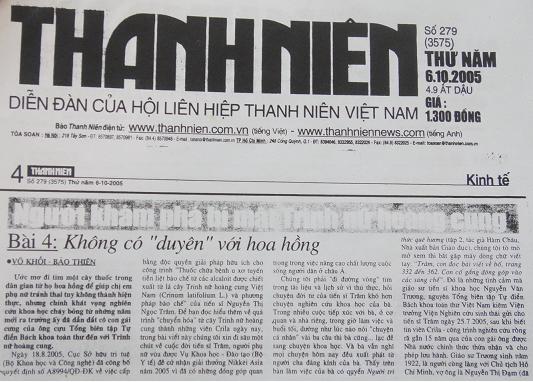 Although Dr. Tram’s dream of finding a new method from a Rosaceae herbal plant for contraception didn’t come true, it’s her strong desire that lead the beloved daughter of the former Editor-in-chief of Vietnam Encyclopaedic Dictionary to Crinum latifolium L.
Although Dr. Tram’s dream of finding a new method from a Rosaceae herbal plant for contraception didn’t come true, it’s her strong desire that lead the beloved daughter of the former Editor-in-chief of Vietnam Encyclopaedic Dictionary to Crinum latifolium L.
On August 18, 2005 a research work named ‘A medicine for the benign prostatic hyperplasia (BHP) utilizing alkaloids extracted from Crinum latifolium L.’s leaves and method of preparation’ conducted by Dr. Nguyen Thi Ngoc Tram was given exclusive rights for a useful solution by the National Office of Intellectual Property of Vietnam (Ministry of Science and Technology) under the Decision No. A8994/QĐ-ĐK. In order for readers to have much more information on the development of Crinum latifolium L. into CRILA®, in this article we mention Dr. Tram’s private life who was awarded the prestigious Nikkei Asia Prize in 2005 by Department of Science and Education (the Ministry of Health) because of her devotion to improving people’s quality of life in Asia.
For us, it’s more difficult to ask about her private life than about her scientific devotion, therefore, we have to search for more information in historical materials. Contacting her several times at her office or her home, as well as in working time or in the evening, it seems that she always turns conversation from her personal life to her work. She thinks that it’s her respectable father that is her driving force. We came across some handwriting in the book ‘Nguoi tri thuc que huong’ (vol 2, written by Ham Chau, Education Publisher) on her desk, ‘Dear my daughter, you read about me from p.332 to p.362’. It’s written for Dr. Tram on July 25, 2005 by Professor and Doctor in Science Nguyen Van Truong - the former Editor-in-chief of Vietnam Encyclopaedic Dictionary and Director of the Ecological Research Institute after hearing about the successful 15-year-prolonged research work of the beloved daughter which was approved for circulation. Prof. Nguyen Van Truong - great-grandson of Nguyen Cong Tru poet and fellow-countryman of Uncle Ho - was born in 1922, whose late wife is Nguyen Thi Dam.
Now, Dr. Tram is Director of CRINA Center of Pharmaceutical Research, Development and Production directly under Phytopharma company, however, her old house remains unchanged with one floor and bookshelves at Nguyen Tri Phuong Str., Dist 10, HCMC. Her husband - a retired lecturer - has the same interest in newspaper and science as hers. Since Dr. Tram became a pharmacist, her father usually asked her ‘Why must we buy medicines from foreign countries while we have many medicinal plants and a large number of pharmacists? You have to create a new medicine from Vietnamese herbal plants.’ The words of her father seemed to be an assignment to Dr. Tram and made her obsessive about her responsibility for national medicine. She shared, ‘While working of protecting the health of mothers and children, I’m planning to create a medicine from Rosaceae traditionally; however, I won a national competition for a grant for postgraduate study overseas in 1984.’ That was the second chance of pursuing her passion for scientific research. Formerly, she missed the first chance of studying at Sweden because of her young daughter. This time, her two daughters weren’t too young anymore, so she couldn’t miss any opportunities.
In 1985, she came to Bulgaria and decided to choose essential oils as her doctoral thesis’s project in chemistry since her professor had a wide knowledge about this section. After upholding her doctoral thesis outstandingly, she was invited to continue as a collaborator in Faculty of Organic Chemistry, Sofia Technical University, Bulgaria. Away from home, she also worked as a Secretary of Cultural Party for many terms - the same generation as Tran Luc actor (now director), Kim Cuong artist, etc.
That was the most difficult period of time to the schoolgirl of Trung Vuong highschool since she was also pursuing her strong desire for scientific research with determination besides her work as a collaborator. She also had a freelance job at Academy of Sciences in Austria, Germany, and Bulgaria; additionally she took part in a team of research on naturally chemical compound to produce medicine. As an Asian section researcher, she had many opportunities to study valuable herbs there. Until 1990, predestinedly she went to Hue and came across Crinum latifolium L.